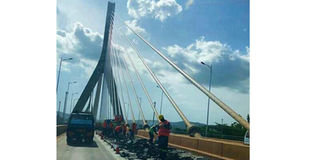Prime
No defects on new Nile Bridge - UNRA

Works. A section of the Source of the Nile Bridge goes under repair on January 27. COURTESY PHOTO
The Uganda National Roads Authority (UNRA) has come out to address public concerns over what some have termed as defects and cracks cited on the new Nile Bridge.
The 500-meter bridge in Jinja District which was commissioned last year by President Museveni has developed cracks according to some travellers with some saying that the tarmac had peeled off and there were black patches on the road surface.
However UNRA’s media relations manager, Mr Allan Sempebwa has said that there is no cause for alarm as it is a deliberate method of construction used by the contractors.
According to him, the wearing course seen and referred to as 'bumpy' or cracked by a section of the public is a non-structural attachment and therefore not a defect on the bridge.
“It's to be replaced with permanent asphalt as soon as investigation on structural behaviour is concluded and baseline data is formed. This will be done within the defect liability period before contractor leaves the site. At the moment, the Contractor has completed all the tests and has embarked on plans to start application of permanent asphalt on the bridge deck but as a contractual requirement, they are preparing a trial section of asphalt on the bridge at the length of approximately 100m on both approaches of the bridge,” he said.
However, another source said the surfacing asphalt did not bond well with water-proofing material on the concrete to give it the required 120-year design life.
“So, the contractor is doing remedial works and later do replacement. The water-proofing material was manufactured in Germany [and] could not bond well with the asphalt done in Uganda. The problem is functional, not structural. The works are under defects liability period of 24 months and [the] contractor will make good at his cost," the source said.


